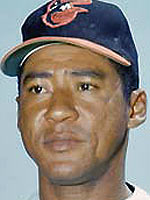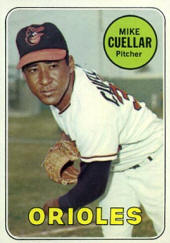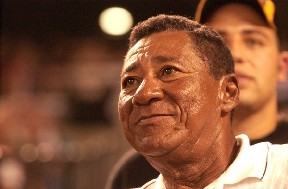 Miguel Ángel Cuellar Santana (May 8, 1937 – April 2, 2010) [KWAY-ar] was a Cuban left-handed starting pitcher who spent fifteen seasons in Major League Baseball (MLB) with the Cincinnati Reds, St. Louis Cardinals, Houston Astros, Baltimore Orioles and California Angels. His best years were spent with the Orioles, helping them capture five American League East Division titles, three consecutive American League (AL) pennants and the 1970 World Series Championship.
Miguel Ángel Cuellar Santana (May 8, 1937 – April 2, 2010) [KWAY-ar] was a Cuban left-handed starting pitcher who spent fifteen seasons in Major League Baseball (MLB) with the Cincinnati Reds, St. Louis Cardinals, Houston Astros, Baltimore Orioles and California Angels. His best years were spent with the Orioles, helping them capture five American League East Division titles, three consecutive American League (AL) pennants and the 1970 World Series Championship.
He shared the AL Cy Young Award in 1969 and won 20-or-more games in a season four times from 1969 to 1974. He was a part of the last starting rotation to feature four pitchers with at least twenty victories each in one season. Cuellar, nicknamed Crazy Horse while with the Orioles, ranks among Baltimore’s top five career leaders in wins (143), strikeouts (1,011), shutouts (30) and innings pitched (2,028), and trails only Dave McNally among left-handers in wins and shutouts.
A clever pitcher with an excellent screwball and change-up, Cuellar was signed by the Cincinnati Reds as an amateur free agent in 1957 after drawing attention with a no-hitter he pitched for an army team in 1955 while serving in the Cuban army during the Batista regime.
Cuellar made his major league debut with Cincinnati in a 14–9 loss to the Philadelphia Phillies at Crosley Field on April 18, 1959. He entered the contest in relief of Don Newcombe in the second inning with the Reds losing 4–2. In his two innings of work, Cuellar surrendered a grand slam to Gene Freese in the third and a two-run double to Al Schroll in the fourth. His only other appearance with the Reds came three days later in its 7–4 defeat to the Milwaukee Braves at County Stadium on April 21. Again he pitched two innings in relief, but he gave up two runs.
Cuellar next spent five years in the minor leagues and Mexican baseball, including periods with the Detroit Tigers and Cleveland Indians farm systems. He was acquired in 1964 by the St. Louis Cardinals, where his win-loss record was 5–5, primarily as a relief pitcher, while the Cardinals made a late-season surge as the Philadelphia Phillies collapsed in September. This took the Cardinals and Cuellar to the 1964 World Series.
Houston Astros.
Cuellar improved his win-loss record to sixteen victories in 1967 for the Astros, setting a team record for left-handed pitchers.
Baltimore Orioles.
Cuellar was traded to the Baltimore Orioles in December 1968. Finally, he had established a permanent role with one of baseball’s up-and-coming franchises, as he found spot in the Orioles’ starting rotation. With the acquisition of Cuellar, joining the likes of Jim Palmer and Dave McNally, and sluggers Frank Robinson, Brooks Robinson and Boog Powell, the Orioles began one of the strongest sequences of years in professional baseball in 1969.
During the 1969 season, Cuellar achieved a win-loss record of 23–11, struck out 182 batters, and recorded an excellent 2.38 earned run average, as Baltimore won a club-record 109 games and the very first American League East Division title (prior to the season, both the American League and National League had been divided into East and West Divisions). For his outstanding year, Cuellar tied the Detroit Tigers’ pitcher Denny McLain for the American League Cy Young Award.
Cuellar becoming the first pitcher born in Latin America to win the Cy Young Award. (Note that following this tie in the voting, the system for voting was changed in a way that did not eliminate the chances for ties for the Cy Young Award, but it did make this tie far more unlikely. No two pitchers have ever tied for the Cy Young Award in either Major League since then.)
Cuellar’s win-loss record was 24–8 in 1970 with a 3.48 ERA and 190 strikeouts.
Cuellar lead the league in victories and in complete games, but he finished just in fourth place in rather-odd voting for the American League Cy Young Award. Once again, the Orioles swept the American League Championship Series in 1970 over the Minnesota Twins, three games to none. Cuellar’s pitching was rather ineffective in Game One of the 1970 American League Championship Series, but Cuellar helped a huge amount with his bat. Cuellar hit the only grand slam home run by any pitcher in a League Championship Series thus far 2010. Also, since the designated hitter has become so well established in the American league, it seems to be likely that no other AL pitcher will ever have the chance again.
Cuellar had a rocky start in Game Two of the 1970 World Series against the upstart National League Champion Cincinnati Reds, with Weaver again pulling him out of the game again, this time in the third inning. In Game Five, Cuellar was again hit hard early, giving up three runs to the Reds in the first inning. It was then that his pitching coach, George Bamberger, advised Cuellar to stop throwing his screwball for the rest of the game. Pitching with just his fastball, curveball, and changeup, Cuellar shut out the Reds for the next eight innings to defeat them 9–3, clinching the World Series title for the Orioles, winning four games to one.
During the five-year stretch of 1969–73, Cuellar was a part of a very strong Orioles pitching staff, teaming with future Hall of Famer Jim Palmer and Dave McNally to form the heart of the finest starting rotation that the Orioles have ever had. Cuellar, Palmer and McNally combined for eight individual 20-win seasons in the 1969, 1970 and 1971 seasons, as the Orioles won the American League championship and advanced to the World Series all three years. Together, the trio racked up a combined win-loss record of 188–72 (.723 winning percentage), while the rest of the Orioles’ pitching staff recorded a very good 130–92 record (.586 winning percentage).
Cuellar’s baseball career from 1972 onwards.
Cuellar won 18 games apiece in both the 1972 and 1973 baseball seasons. In 1972, the Orioles did not make it to the playoffs, finishing behind the Detroit Tigers, but they were back again in 1973, winning the AL Eastern Division title. In Game Three of the American League Championship Series against the defending World Series Champion Oakland Athletics, Cuellar pitched every inning of an 11-inning game, ultimately losing by a score of 2–1 to the A’s.
During his 15-season career Cuellar had a win-loss record of 185–130 with a 3.14 ERA, 1,632 strikeouts, 172 complete games, 36 shutouts, and 11 saves in 453 games and 2,808 innings pitched. In five American League Championship Series and three World Series appearances, Cuellar pitched in 12 games, winning four games and losing four with a 2.85 ERA while recording 56 strikeouts.
Also, on August 10, 1971, Cuellar threw the pitch that Harmon Killebrew hit for his 500th career home run.
In a 1976 Esquire magazine article, sportswriter Harry Stein published an “All Time All-Star Argument Starter,” consisting of five ethnic baseball teams. Cuellar, a Cuban, was the left-handed pitcher on Stein’s Latino team.
After his baseball career ended, Cuellar resided in Orlando, Florida, and he was an active participant in the Hispanic Heritage Month event.
Death.
On April 2, 2010, Cuellar died of stomach cancer at the Orlando Regional Medical Center in Orlando, Florida. He was the third of the Orioles’ four 20-game winners in 1971 to perish, following Dave McNally in 2002 and Pat Dobson in 2006. Only Jim Palmer survives them.
Other career highlights.
* A four-time member of the American League All-Star Team (1967, 1970–71, and 1974)
* Led the American League in winning percentage in 1974.
* Finished eighth in the voting for the American League MVP in 1969, and tenth in the voting for MVP in 1974.
* Became the first player to hit a grand slam in any League Championship Series in 1970 against the Minnesota Twins. He remains the only pitcher to hit a grand slam in any League Championship Series.
Agencies/Various/Wiki/InternetPhotos/youtube/thecubanhistory.com
The Cuban History, Hollywood.
Arnoldo Varona, Editor.



 SPORTS: Mike Cuellar, famous baseball pitcher. (born in Santa Clara) ** Mike Cuellar, famoso jugador cubano de béisbol.
SPORTS: Mike Cuellar, famous baseball pitcher. (born in Santa Clara) ** Mike Cuellar, famoso jugador cubano de béisbol.


